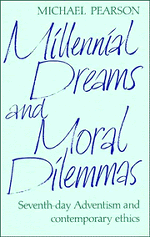Book contents
- Frontmatter
- Contents
- Acknowledgements
- I INTRODUCTION
- II MAJOR INFLUENCES IN ADVENTIST MORAL THOUGHT
- 2 Advent and remnant: two major doctrinal influences
- 3 Keeping the family together: stable homes and a united church
- 4 A cultural legacy: Victorian and American
- III ISSUES OF HUMAN SEXUALITY
- IV POSTSCRIPT
- Notes
- Select bibliography
4 - A cultural legacy: Victorian and American
Published online by Cambridge University Press: 29 September 2009
- Frontmatter
- Contents
- Acknowledgements
- I INTRODUCTION
- II MAJOR INFLUENCES IN ADVENTIST MORAL THOUGHT
- 2 Advent and remnant: two major doctrinal influences
- 3 Keeping the family together: stable homes and a united church
- 4 A cultural legacy: Victorian and American
- III ISSUES OF HUMAN SEXUALITY
- IV POSTSCRIPT
- Notes
- Select bibliography
Summary
Ethics and taboos
Schwartz has rightly observed that Adventism, unlike Pentecostalism, provides its members with a highly developed ethical sub-system. Inasmuch as the pioneers considered Adventism to be a refined form of Reformation Christianity, Adventist moral teaching constituted, in some measure at least, a ‘fine-tuning’ of traditional Christian morality. In early Adventist literature, one was more likely to read about the evils of dancing and tea-drinking, for example, than about respecting property or keeping promises. These highly specific prohibitions, or taboos, included the consumption of alcohol, coffee, condiments, and meat (especially pork), the use of tobacco and cosmetics, the wearing of immodest dress and jewellery, card-playing, gambling, the theatre, and other forms of worldly entertainment. They related to easily observable behaviour and provided convenient criteria for distinguishing the ‘good’ member from the less faithful, the Adventist from the non-Adventist. They functioned, together with Sabbath observance, as powerful markers of Adventist identity, and as such were strongly endorsed by Ellen White. Many of these prohibitions remain quite firmly in place, while others have been subject to some erosion.
Some of these prohibitions can be seen as a reflection of Victorian concerns; others are not so easily explained. Adventists see the provision of a clearly defined behavioural code as a divine providence; certainly, modern research on the hazards of smoking, the consumption of alcohol, and even meat, has confirmed its benefits to the health of the Adventist community.
- Type
- Chapter
- Information
- Millennial Dreams and Moral DilemmasSeventh-Day Adventism and Contemporary Ethics, pp. 43 - 52Publisher: Cambridge University PressPrint publication year: 1990



